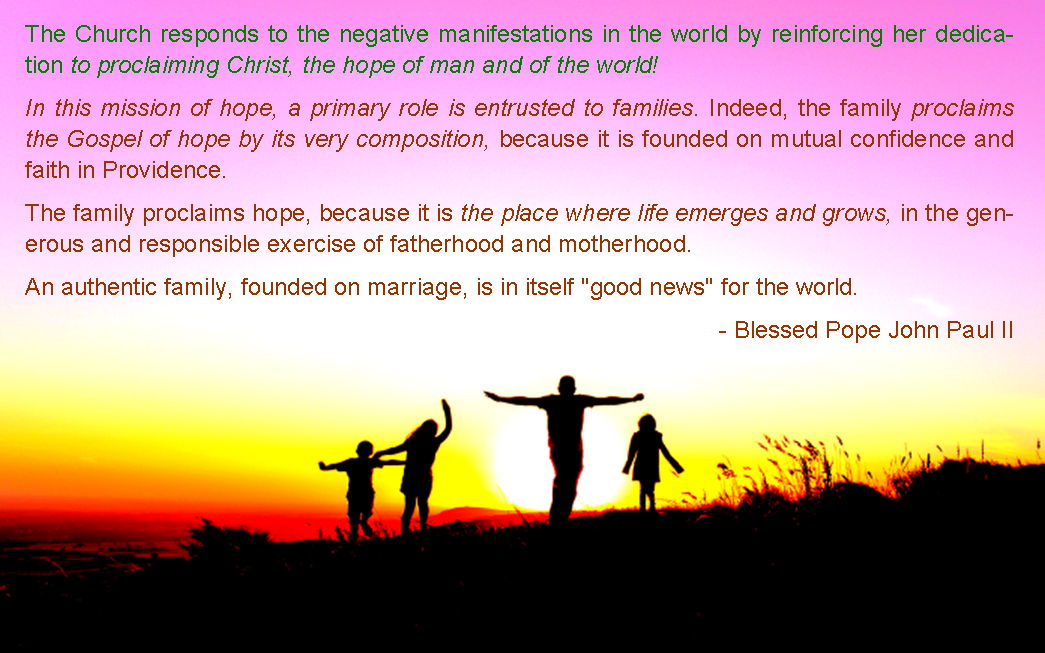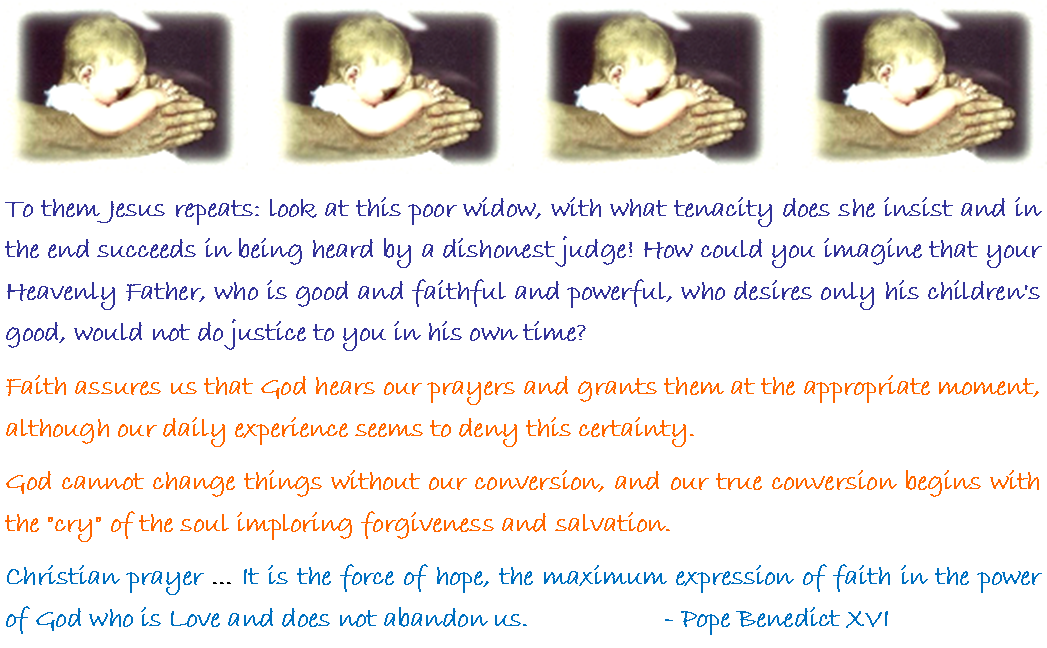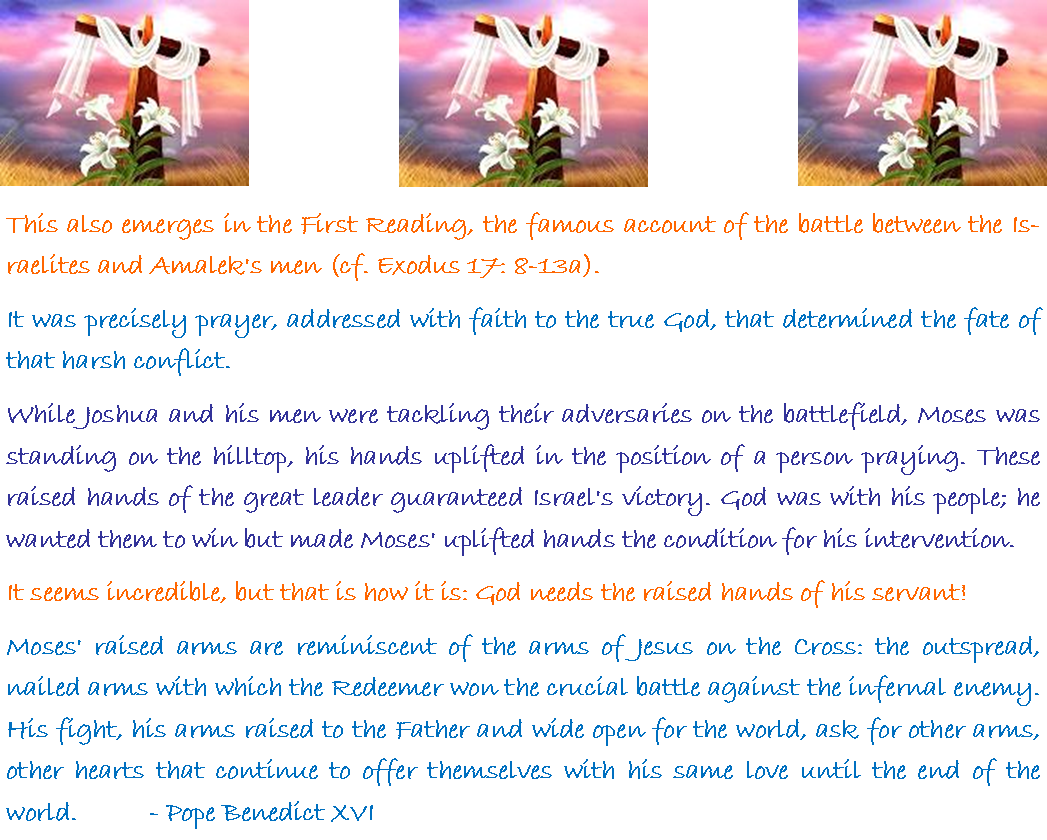|
74 |

|
JOHN PAUL II ANGELUS Sunday 21 October 2001
Dear Brothers and Sisters,
1. Today we celebrate World Mission Sunday, which Pope Pius XI instituted 75 years ago. It reminds the entire People of God of the perennial timeliness of the mission entrusted by Christ to his Church to proclaim the Gospel to all nations (cf. Matthew 28,19). This mandate acquired the greatest urgency at the beginning of the third millennium, if we think of the great multitude of humanity that still does not know or recognize Christ. Therefore, today the mission "ad gentes" to all peoples is more necessary than ever.
They have the gift of living in the land that is holy for Jews, Christians and Muslims. All must be determined to make it, finally, a land of peace and fraternity.
In this mission of hope, a primary role is entrusted to families. Indeed, the family proclaims the Gospel of hope by its very composition, because it is founded on mutual confidence and faith in Providence. The family proclaims hope, because it is the place where life emerges and grows, in the generous and responsible exercise of fatherhood and motherhood. An authentic family, founded on marriage, is in itself "good news" for the world.
Moreover, in our time the families that collaborate actively in evangelization are ever more numerous, either in their own parish or diocese, or by participating in the mission "ad gentes" itself. Yes, dear families, the hour of the family has arrived in the Church, which is also the hour of the missionary family. It is confirmed by today's beatification of the spouses Luigi Beltrame Quattrocchi and Maria Corsini. We especially entrust the missionary dedication of Christian families to their intercession, united to that of the Blessed Virgin Mary.
3. We do this before the image of Our Lady of Loreto, who yesterday and today has been among us, helping us to appreciate the maternal presence of the Virgin more concretely and to relive the spirit of the Holy Family of Nazareth. In this same spirit, we now recite the Angelus prayer.
Acknowledgment: We thank the Vatican Publisher for allowing us to publish the Homilies of Blessed Pope John Paul II, so that it could be accessed by more people all over the world; as a source of God’s encouragements to all of us.
PASTORAL VISIT EUCHARISTIC CELEBRATION HOMILY OF HIS HOLINESS BENEDICT XVI Piazza del Plebiscito, Naples
Venerable Brothers in the Episcopate and in the Priesthood,
I accepted with great joy the invitation to visit the Christian community that lives in this historical city of Naples. I first offer Cardinal Crescenzio Sepe, your Archbishop, a fraternal embrace and my special thanks for his words on your behalf at the beginning of this solemn Eucharistic Celebration. I sent him to your Community knowing of his apostolic zeal and I am happy to see that you appreciate him for his gifts of mind and heart. I greet with affection the Auxiliary Bishops and diocesan priests, as well as the men and women religious and other consecrated persons, the catechists and the lay people, especially the youth actively involved in various pastoral, apostolic and social initiatives. I greet the distinguished civil and military Authorities who honour us with their presence, starting with the Prime Minister, the Mayor of Naples and the Presidents of the Province and Region. To you all, gathered in this Square in front of the monumental Basilica dedicated to St Francis of Paola, the fifth centenary of whose death is being celebrated this year, I address my cordial thoughts, which I willingly extend to all those who have joined us via radio and television, especially the cloistered communities, the elderly, those in the hospital or prison and those whom I will be unable to meet in this short Visit to Naples. In a word, I greet the entire family of believers and all citizens of Naples: I am among you, dear friends, to break with you the Word and the Bread of Life, and the bad weather does not discourage us because Naples is always beautiful!
In meditating on the biblical Readings for this Sunday and thinking of the situation of Naples, I was struck by the fact that today the main theme of the Word of God is prayer; indeed, we "ought always to pray and not lose heart", as the Gospel says (cf. Luke 18: 1). At first sight, this might seem a message not particularly relevant, unrealistic, not very incisive with regard to a social reality with so many problems such as yours. But, if we think about it, we understand that this Word contains a message that certainly goes against the tide and yet is destined to illuminate in depth the conscience of this Church and city of yours. I would sum it up like this: the power that changes the world and transforms it into the Kingdom of God, in silence and without fanfare, is faith - and prayer is the expression of faith. When faith is filled with love for God, recognized as a good and just Father, prayer becomes persevering, insistent, it becomes a groan of the spirit, a cry of the soul that penetrates God's Heart. Thus, prayer becomes the greatest transforming power in the world. In the face of a difficult and complex social reality, as yours certainly is, it is essential to strengthen hope which is based on faith and expressed in unflagging prayer. It is prayer that keeps the torch of faith alight. Jesus asks, as we heard at the end of the Gospel: "When the Son of Man comes, will he find faith on earth?" (Luke 18: 8). It is a question that makes us think. What will be our answer to this disturbing question? Today, let us repeat together with humble courage: Lord, in coming among us at this Sunday celebration you find us gathered together with the lamp of faith lit. We believe and trust in you! Increase our faith! |

|
The biblical Readings we have heard present several models to inspire us in our profession of faith, which is also always a profession of hope because faith and hope open the earth to divine power, to the power for good. They are the figures of the widow, whom we encounter in the Gospel parable, and of Moses, of whom the Book of Exodus speaks. The widow of the Gospel (cf. Luke 18: 1-8) makes us think of the "little", the lowliest, but also of so many simple, upright people who suffer because of abuse, who feel powerless in the face of the perturbing social malaise and are tempted to despair. To them Jesus repeats: look at this poor widow, with what tenacity does she insist and in the end succeeds in being heard by a dishonest judge! How could you imagine that your Heavenly Father, who is good and faithful and powerful, who desires only his children's good, would not do justice to you in his own time? Faith assures us that God hears our prayers and grants them at the appropriate moment, although our daily experience seems to deny this certainty. In fact, in the face of certain events in the news or of life's numerous daily hardships which the press does not even mention; the supplication of the ancient Prophet: "O Lord, how long shall I cry for help and you will not hear? Or cry to you, "Violence!' and you will not save?" (Habakkuk 1: 2) wells up in the heart spontaneously. There is one answer to this heartfelt invocation: God cannot change things without our conversion, and our true conversion begins with the "cry" of the soul imploring forgiveness and salvation. Christian prayer is not, therefore, an expression of fatalism or inertia; on the contrary, it is the opposite of evasion from reality, from consoling intimism. It is the force of hope, the maximum expression of faith in the power of God who is Love and does not abandon us. The prayer Jesus taught us which culminated in Gethsemane has the character of "competitiveness", that is, of a struggle because we line up with determination at the Lord's side to fight injustice and conquer evil with good; it is the weapon of the lowly and the poor in spirit, who reject every type of violence. Indeed, they respond to it with evangelical non-violence, thereby testifying that the truth of Love is stronger than hatred and death. |

|
This also emerges in the First Reading, the famous account of the battle between the Israelites and Amalek's men (cf. Exodus 17: 8-13a). It was precisely prayer, addressed with faith to the true God, that determined the fate of that harsh conflict. While Joshua and his men were tackling their adversaries on the battlefield, Moses was standing on the hilltop, his hands uplifted in the position of a person praying. These raised hands of the great leader guaranteed Israel's victory. God was with his people; he wanted them to win but made Moses' uplifted hands the condition for his intervention.
And now, inwardly enlightened by the Word of God, let us return to look at the reality of your city, where there is no lack of healthy energy, good people, cultured and with a keen sense of family.
Dear brothers and sisters, beloved Pope John Paul II visited Naples for the first time in 1979: it was, like today, on Sunday, 21 October! He came a second time in November 1990: a Visit that encouraged the rebirth of hope. The Church's mission is always nourished by the faith and hope of the Christian people. This is also what your Archbishop is doing. He recently wrote a Pastoral Letter with the significant title: "Blood and hope". Yes, true hope is only born from the Blood of Christ and blood poured out for him. There is blood which is the sign of death, but there is also blood that expresses love and life. The Blood of Jesus and the blood of the Martyrs, like that of your own beloved Patron St Januarius, is a source of new life. I would like to conclude by making my own a saying from your Archbishop's Pastoral Letter that sounds like this: "The seed of hope may be the tiniest but can give life to a flourishing tree and bear abundant fruit". This seed exists and is active in Naples, despite the problems and difficulties. Let us pray to the Lord that he will cause an authentic faith and firm hope to grow in the Christian community that can effectively oppose discouragement and violence. Naples certainly needs appropriate political interventions, but first it needs a profound spiritual renewal; it needs believers who put their full trust back in God and with his help work hard to spread Gospel values in society. Let us ask Mary's help with this, as well as that of your holy Protectors, especially St Januarius. Amen!
PAPAL MASS FOR THE CANONIZATION OF NEW SAINTS: STANISŁAW KAZIMIERCZYK SOŁTYS (1433 - 1489) HOMILY OF HIS HOLINESS BENEDICT XVI St. Peter's Square
Dear Brothers and Sisters,
The celebration of holiness is renewed today in St Peter's Square. I joyfully address my cordial welcome to you who have come from even very far away to take part in it. I offer a special greeting to the Cardinals, to the Bishops and to the Superiors General of the Institutes founded by the new Saints, as well as to the Official Delegations and to all the Civil Authorities. Let us seek together to understand what the Lord tells us in the Sacred Scriptures proclaimed just now. This Sunday's Liturgy offers us a fundamental teaching: the need to pray always, without tiring. At times we grow weary of praying, we have the impression that prayer is not so useful for life, that it is not very effective. We are therefore tempted to throw ourselves into activity, to use all the human means for attaining our goals and we do not turn to God. Jesus himself says that it is necessary to pray always, and does so in a specific parable (cf. Luke 18: 1-8).
Continue next page …
27 October 2013 |